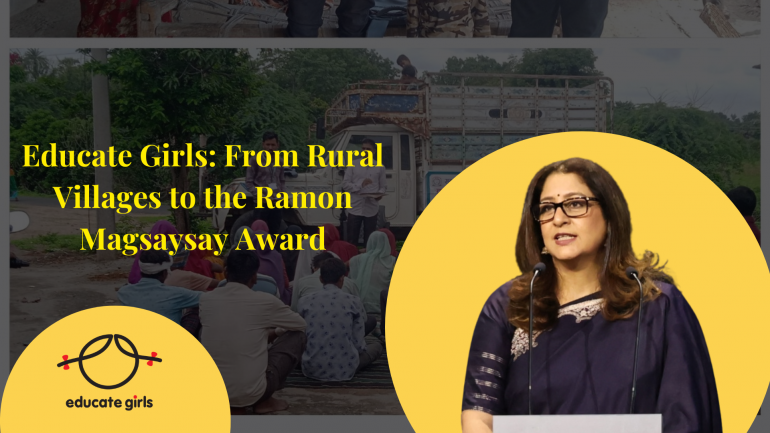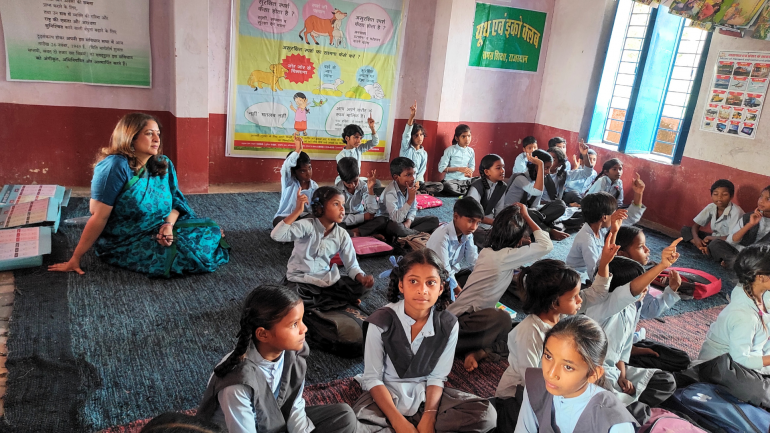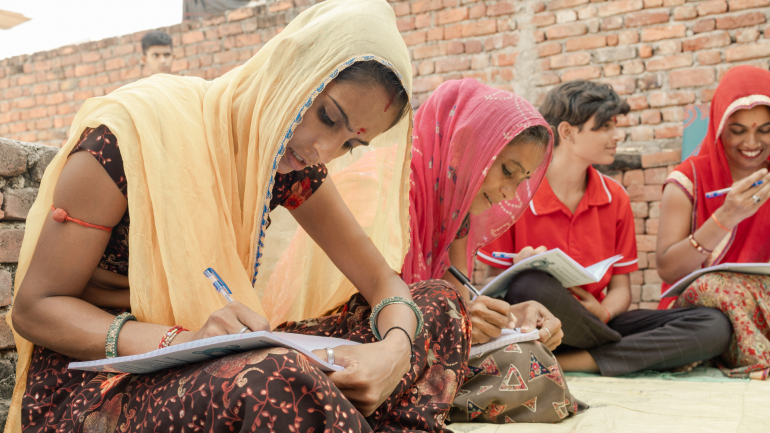Educate Girls: From Rural Villages to the Ramon Magsaysay Award

For the first time, an Indian organization has been chosen as a laureate for the Ramon Magsaysay Award. The honor went to the Foundation to Educate Girls Globally, better known as Educate Girls, in recognition of its bold commitment to breaking cultural stereotypes through education and empowering millions of girls in rural India.
Since 1958, the Ramon Magsaysay Award Foundation has celebrated transformative leaders across Asia who embody selfless service and greatness of spirit. To date, 328 individuals and 28 organizations have received Asia’s highest honor. “This recognition belongs to thousands of volunteers, partners, and team members who have worked tirelessly for one mission: to find out-of-school girls, bring them back into education, and help them stay, learn, and thrive,” said founder Safeena Husain of Educate Girls.
A Mission Rooted in Personal Experience
The roots of Educate Girls lie in Husain’s own childhood. Her education was interrupted until her aunt intervened with love and encouragement, pushing her to return to school and eventually become the first in her family to study abroad at the London School of Economics. After a successful nonprofit career overseas, she returned to India in 2005, determined to extend the same gift of opportunity to other girls.
She founded Educate Girls in 2007 with a clear mission: to mobilize communities to ensure that every girl is in school and learning well. From a fragile start in Rajasthan’s villages, the organization has grown into one of India’s largest grassroots education movements, spanning over 30,000 villages in four states.
What Educate Girls Does
Educate Girls operates through a simple but powerful model. It identifies villages with the highest concentrations of out-of-school girls. Local volunteers, known as Team Balika, then go door-to-door persuading families, addressing concerns, and helping with paperwork. Inside schools, the NGO provides remedial education to help girls catch up academically, life-skills training to build confidence, and support to school committees for better facilities like toilets and safe boundary walls.
The organization also runs the Pragati (Second Chance) Program, enabling adolescent girls and young women who dropped out to prepare for open school examinations. Many of these girls, denied education for years, are now proudly completing their 10th-grade exams, a vital milestone for employability, vocational training, or higher studies.

Partnerships and Government Collaboration
From the outset, Educate Girls aligned itself with government systems rather than creating parallel structures. It partners with public schools, village councils, and state departments, complementing government efforts to improve access and learning. Authorities often invite them to fill gaps.
Internationally, the NGO has shared its worksheets and curricula with schools in Kenya, Malawi, and Tanzania, proving that its methods travel beyond India. Its pioneering use of a Development Impact Bond in education exceeded targets and inspired over 227 similar social-finance initiatives worldwide, channeling nearly a billion dollars into impact-driven programs.
Growth and Accomplishments
In just 18 years, Educate Girls has grown to 2,000 employees and over 23,000 volunteers. Its impact is staggering:
- 2 million girls reached so far.
- 90% retention rates in schools.
- Enrollment targets exceeded by 116%.
- Learning outcomes exceeded by 160%.
Its latest vision, 10 by 10, seeks to bring quality education to 10 million girls in the next decade.
Struggles and Values
The journey has not been without obstacles. In its early days, the NGO nearly shut down for lack of funds. Staff worked for months without pay. The leadership made difficult ethical choices, refusing donor demands that clashed with the mission, and even walking away from a major funder who disrespected a child. “Our values and respect for our girls must always come first,” Husain said. That moral clarity, leaders believe, has been the glue holding the organization together.

Transformative Stories
Statistics tell part of the story, but the human transformations are where Educate Girls’ impact truly shines.
- A father transformed: In Rajasthan, a father who once refused to let his daughters attend school eventually enrolled them after relentless persuasion. Years later, he told Safeena Husain, “If you’re not educated, you will be exploited like animals. The world today is built for the educated.” His reversal became a beacon for other families in his community.
- The fearless child bride: In a tribal area, an 18-year-old girl who had been married off at eight and out of school for a decade passed her 10th-grade exam through the Pragati program. “Her courage and fearlessness stay with me every single day,” Husain said.
- The midnight scholar: In Madhya Pradesh, a 27-year-old mother of two, burdened with caregiving duties for her injured father-in-law, studied until 1 a.m. after finishing household chores. Her persistence paid off, she topped the state exam. “She gives me so much energy and inspiration,” said a team member.
- The unexpected ally: In one village meeting, a young man challenged the idea of girls’ education, warning that educated girls would “run away.” Before Husain could respond, a local volunteer countered, pointing out that even the village headmaster’s daughter, a master’s degree holder, had not “run away.” The headmaster rebuked the challenger, and the crowd’s opinion shifted. It was a turning point that proved change comes from within communities.
- The angel volunteers: Team Balika has grown into a movement of 23,000 gender champions. Among them was Sanjay, a young man who joined after witnessing his sister’s struggles. “I couldn’t help her,” he said, “but I want to make sure no other girl suffers like she did.” His story, like many others, shows how men have become allies in reshaping patriarchal norms.
- A proud mother: In Rajasthan, a mother who sat the 10th exam alongside her teenage son not only passed but scored higher. “Her son looked at her with new respect,” Husain recalled. “That’s the kind of transformation education brings, not just to individuals but to entire families.”
Looking Ahead
Educate Girls’ leaders describe the organization as an orchestra, with Husain as conductor. Whether through advanced algorithms or volunteers knocking on doors, its purpose remains the same: to bring girls out of kitchens and cattle fields into classrooms and futures of dignity.
As CEO Gayatri Lobo put it, “When everyone is aligned on the same vision, and when decisions are rooted in data, even a vast, decentralized organization can move in the same direction.”
From the announcement in Manila to the distant villages of Rajasthan and Madhya Pradesh, Educate Girls’ recognition with the 2025 Ramon Magsaysay Award affirms not only its achievements but also its promise: to keep unlocking classrooms, dreams, and futures for millions more girls.








